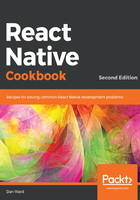
上QQ阅读APP看书,第一时间看更新
How to do it...
- We're going to create a new folder called images in the root of the project and add the heart image to the new folder.
- Let's import the dependencies for this class next:
import React, { Component } from 'react';
import {
StyleSheet,
View,
Image,
Text,
TouchableHighlight,
} from 'react-native';
const heartIcon = require('./images/heart.png');
- For this recipe, we need to keep track of whether the button has been pressed. We'll use a state object with a liked Boolean property for this purpose. The initial class should look like this:
export default class App extends React.Component {
state = {
liked: false,
};
handleButtonPress = () => {
// Defined in a later step
}
render() {
// Defined in a later step
}
}
- We need to define the content of our new component inside the render method. Here, we're going to define the Image button and a Text element underneath it:
export default class App extends React.Component {
state = {
liked: false,
};
handleButtonPress = () => {
// Defined in a later step
}
render() {
return (
<View style={styles.container}>
<TouchableHighlight
style={styles.button}
underlayColor="#fefefe"
>
<Image
source={heartIcon}
style={styles.icon}
/>
</TouchableHighlight>
<Text style={styles.text}>Do you like this app?</Text>
</View>
);
}
}
- Let's define some styles to set dimensions, position, margins, colors, and so on:
const styles = StyleSheet.create({
container: {
marginTop: 50,
alignItems: 'center',
},
button: {
borderRadius: 5,
padding: 10,
},
icon: {
width: 180,
height: 180,
tintColor: '#f1f1f1',
},
liked: {
tintColor: '#e74c3c',
},
text: {
marginTop: 20,
},
});
- When we run the project on the simulators, we should have something similar to the following screenshot:

- In order to respond to the tap event, we need to define the content of the handleButtonPress function and assign it as a callback to the onPress property:
handleButtonPress = () => {
this.setState({
liked: !this.state.liked,
});
}
render() {
return (
<View style={styles.container}>
<TouchableHighlight
onPress={this.handleButtonPress}
style={styles.button}
underlayColor="#fefefe"
>
<Image
source={heartIcon}
style={styles.icon}
/>
</TouchableHighlight>
<Text style={styles.text}>Do you like this app?</Text>
</View>
);
}
- If we test our code, we won't see anything changing on the UI, even though the state on the component changes when we press the button. Let's add a different color to the image when the state changes. That way, we'll be able to see a response from the UI:
render() {
const likedStyles = this.state.liked ? styles.liked : undefined;
return (
<View style={styles.container}>
<TouchableHighlight
onPress={this.handleButtonPress}
style={styles.button}
underlayColor="#fefefe"
>
<Image
source={heartIcon}
style={[styles.icon, likedStyles]}
/>
</TouchableHighlight>
<Text style={styles.text}>Do you like this app?</Text>
</View>
);
}